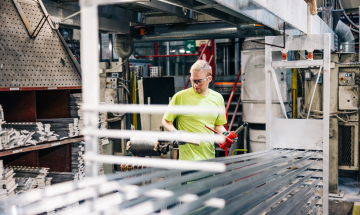
Finnish Technology Industries wishes to avoid a new Competitiveness Pact – cost-competitiveness must be ensured through labour market agreements
“We achieved the most progress in the talks between the Federation and the Industrial Union, but unfortunately we were unable to reach a consensus. The main sticking point was the potential cost impact of the deal in a declining economy,” says Minna Helle, Executive Director, Industrial Relations at Finnish Technology Industries.
Helle hopes that the parties will return to the table as soon as possible to actively seek solutions. It is by no means unusual to have to undergo talks in a situation where there is no valid agreement.
“The cost impact of a collective agreement consists of pay policies, working hours and other things referred to as ‘text issues’. The employers have been actively exploring potential solutions. The overall deal must be such that businesses will remain competitive even if the economy is stagnating and there is increasing competition for orders,” says Helle.
Avoiding a new Competitiveness Pact through cost-competitiveness
“Finnish Technology Industries does not want to end up in a situation where yet another Competitiveness Pact would be needed. We want to ensure cost-competitiveness so that businesses will be able to thrive and to provide employment. If the agreements reached are too expensive, we will sooner or later inevitably face the necessity of taking painful corrective action. That is what we want to avoid,” says Helle emphatically.
According to the Bank of Finland, cost-competitiveness has improved in recent years, but there is catching up to do vis-à-vis our competitors.
Helle notes that labour market agreements are a key factor for employment. Economic growth is slowing down, and the business environment is uncertain. In this situation, the priority is to achieve an agreement structure that will improve the cost-competitiveness of businesses. Such an agreement will be the best possible way to safeguard jobs and the purchasing power of wage earners.
“About two thirds of companies in industrial sectors represented by Finnish Technology Industries already report that they are seeing a decline in new orders. The number of invitations to tender has also decreased substantially. If we make mistakes on the labour market, the result will be a rapid downturn in employment,” says Helle.
It is the aim of Finnish Technology Industries to achieve labour market agreements as quickly as possible. The business environment is uncertain, and stability and industrial peace are what the labour market now needs.
Further information:
Minna Helle, Executive Director, Industrial Relations, phone +358 50 341 4884


